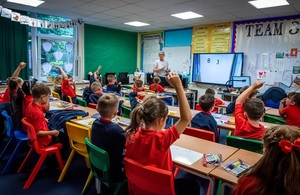A unique education project in West Cumbria has graduated to its second year

WELL prepared for the new term
The Western Excellence in Learning and Leadership (WELL) Project is an ambitious programme of targeted investments and interventions to improve educational outcomes in the region, particularly for the most disadvantaged.
It launched in 2019 with £1.7 million of funding from Sellafield Ltd and the Nuclear Decommissioning Authority and was co-created with Cumbria County Council and local schools.
Earlier this year it was granted additional funding of almost £4 million over the next 3 years.
WELL is a collaborative project that draws on national and international research and works closely with the Education Endowment Foundation (EEF) and their Research School network.
The funding will be targeted at areas of need in schools and colleges in the boroughs of Copeland and Allerdale, and the project independently evaluated by the University of Nottingham in partnership with the Centre for the Use of Research and Evidence in Education.
Gary McKeating, Sellafield Ltd’s head of community and development, said:
The WELL Project is a key strand of Sellafield Ltd’s Social Impact Multiplied (SiX) programme, which has a central commitment to helping communities unlock a sustainable and prosperous future.
WELL is already making significant progress in its work to help improve teaching, raise pupil achievement and enhance the health and wellbeing of students in our communities, and there is much more to come.
It’s a great example of how we can multiply our collective impact when we work collaboratively and take an evidence-led approach.
The strengths of this partnering and evidence-led approach were demonstrated last year when the COVID-19 pandemic led to many planned WELL activities being paused.
The impact of COVID-19 on the achievement and wellbeing of pupils meant there was an immediate need to support young people and teachers to aid their recovery and help them catch up on learning.
In response, over £500,000 of WELL funding was provided to eligible schools with disadvantaged pupils to provide technology for remote learning, development and support for teachers and students, and breakfasts for vulnerable and key workers’ children.
Lindsay Burnett, headteacher at Montreal CofE Primary School, Cleator, said:
The WELL project has given a drive to schools and the capacity to be able to rethink how we can support our most vulnerable pupils.
It has increased conversations and actions about what we can do to support those that are disadvantaged.“More children are receiving high quality educational experiences through funding support for physical resources but also development of our leaders and teachers.
Professor Becky Francis, CEO of the Education Endowment Foundation, said:
It is extremely encouraging, particularly in these challenging times, to see projects such as WELL facilitating Cumbrian schools’ engagement with evidence-informed approaches to teaching and learning.
Its central focus -on broadening access to research-based training and high-quality educational programmes to improve pupils’ academic outcomes- is one that mirrors the core mission of the EEF nationally.The appointment of Ashfield Junior School in Workington as a Research School will be a valuable source of support for others in the region.
Additional information
Social Impact Multiplied (SiX) programme – Social Impact Strategy
Introducing SiX, Sellafield Ltd’s new social impact programme











Responses